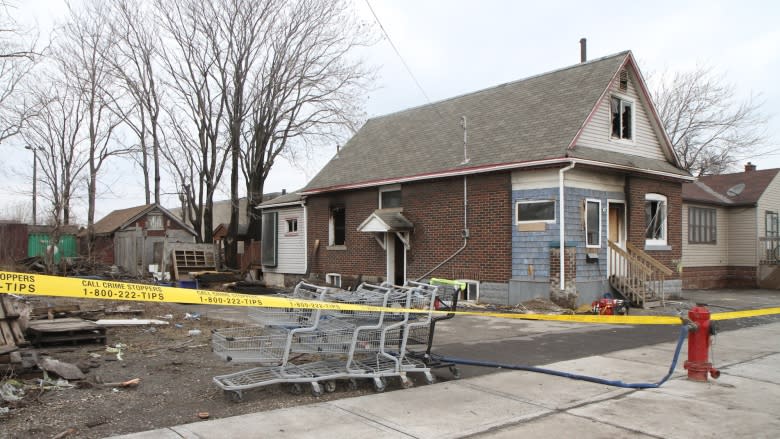Man who killed his girlfriend sues jail for failing to keep him safe from revenge attacks
A Hamilton man who killed his girlfriend two years ago is suing the province, the Barton Street jail and police, claiming that authorities failed to keep him safe from revenge beatings while in custody.
Joseph Snelgrove says even after he eventually was placed in protective custody, jail guards failed to protect him from suffering that he claims was "foreseeable."
That, according to his lawsuit, was despite the fact "… that he was a white man accused of killing a native woman, whose death was being widely disseminated through the media; and that he was being put on a range containing native men."
He claims that he was exposed to even greater risk of retribution because of the "political and social climate" arising from the inquiry into Missing and Murdered Indigenous Women.
Snelgrove claims in his suit that he was attacked and rendered unconscious by at least two inmates – so severely that he broke four ribs, had a concussion, needed stitches on his mouth and was hospitalized for seven days. He believes at least one of his attackers was Indigenous.
He's suing for at least $850,000.
At the time of the jail assaults, Snelgrove had not been convicted, an important factor in the lawsuit, says his lawyer.
"As much as people or the government sometimes think that they can just warehouse and forget these people, at this stage on the [pre-trial] side they're still presumed innocent," said Snelgrove's lawyer, Michael Moon.
"They do have an obligation to keep them safe and provide them with minimal standards of treatment."
But a childhood friend of Renee Neganiwina, the woman who died, said despite any suffering Snelgrove has experienced, he still is alive and she is dead.
"He murdered my best friend, practically my sister," said Vince Jacobs. "He is lucky he is alive and breathing."
The Ministry of Community Safety and Correctional Services, which oversees the Barton jail, declined to comment on the lawsuit while it is before the courts.
'The situation awaiting him there'
Snelgrove pleaded guilty to manslaughter in May in connection with the death of Neganiwina, in March 2015. He'd left the house they shared in anger, dousing a sofa with flammable liquid and setting it on fire.
Neganiwina died in the fire. She was 26.
Snelgrove, then 38, claims he didn't intend for her to die and that he didn't know she had taken sleeping pills along with alcohol and wouldn't hear the smoke alarm. Police had originally charged him with second-degree murder, but his guilty plea was to manslaughter.
By the time he was taken to the Hamilton-Wentworth Detention Centre on Barton Street, the fatal fire was all over the media, the lawsuit states.
He first went to the general population range at the jail, he said in his lawsuit, and "immediately began to receive retributive threats" from other inmates.
He asked to be transferred to protective custody, and says the corrections officers didn't give him "any warnings … as to the situation awaiting him there."
That "situation," his lawsuit states, was the possible affinity ties between his fellow inmates and his late girlfriend.
'Inmate-on-inmate violence'
Snelgrove believes jail authorities and the corrections officers should have anticipated that he was in danger of assault, and also contends that they didn't "take the necessary steps" to stop the assault.
Moon, his lawyer, cited a recent decision by Ontario Court of Appeal that jail authorities were liable for the injuries one gang member sustained from a rival gang member when they were housed together.
"The guards have to be, and the jails have to be alert to these potential conflicts, inmate-on-inmate violence – it's just rife throughout the institutions," Moon said.
Jacobs said Neganiwina's family has been traumatized by her death, and there are still people who wish Snelgrove harm.
"I believe that he has the right to sue and seek safety like any other human being, however those who have had contact with the prison lifestyle are likely to be hurt," he said. "In my opinion, he is still alive because the guards did their job."
'That's not justice. That's just revenge'
In May, he was sentenced to eight-and-a-half years in federal penitentiary. His lawsuit, however, says he suffered significant and lasting physical, mental and emotional harm. He claims he has lost enjoyment and amenities of life, is unable to participate in social and recreational activities, suffered an impairment of his ability to live a normal life, and suffered humiliation and indignity.
Moon, his lawyer, said he should still be able to claim such quality-of-life damages despite his current incarceration.
"The fact of the matter is that he's going to be released one day," he said.
"Even if we are unable to see or provide him with any sympathy, that doesn't mean that we should sit back and rub our hands gleefully while he gets beaten and … potentially killed in jail," Moon said. "That's not justice. That's just revenge."
Snelgrove also names Hamilton Police Services Board in his claim, alleging they should have made sure the jail staff knew were "fully apprised" of his situation. The police board has filed a notice in court that it intends to defend the lawsuit.
kelly.bennett@cbc.ca




